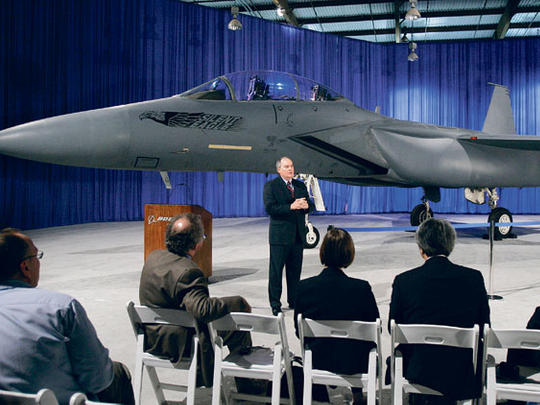
Farnborough/Washington: A proposed US arms sale to Saudi Arabia will include 84 new Boeing F15 fighter jets and may be valued at as much as $30 billion (Dh110 billion), according to a government official familiar with the plan.
The deal also calls for selling 72 UH-60 Black Hawk helicopters built by United Technologies Corp's Sikorsky unit and refurbishing 70 Saudi F-15s, said the official, who asked not to be identified because terms are still under discussion.
Navy Vice Admiral Jeffrey Wieringa, director of the Defence Security Cooperation Agency, which oversees foreign sales, said separately yesterday that Congress may be formally notified "within two months" about the transaction, which he said includes F15s, helicopters, ships and missile-defence systems. He said he couldn't give specifics.
"There are three major efforts for Saudi Arabia — aviation, Army missile defence-related and Navy," Wieringa said in an interview at the Farnborough Air Show near London. "We have been working all those for about four years or so. Saudi is a key country for us and we continue to work hard."
Negotiations were already under way in Aug-ust 2007, when Wieringa's predecessor, then-Air Force Lieutenant General Jeffrey Kohler, said in an interview that a sale to the kingdom might be valued at as much as $20 billion and include F15s, Littoral Combat Ships and satellite-guided bomb kits.
Bolstering allies
Completing the deal would be a step toward President Barack Obama's goal of buttressing the defence capabilities of Middle East allies to counter Iran's growing offensive missile might and suspected nuclear weapons programme. It would be part of the Gulf Security Initiative started by the Bush administration.
The $30 billion total includes hardware as well as spare parts, training and support, according to the government official who asked not to be identified.
Saudi Arabia's last significant US weapons purchase was 72 F-15s in 1992, a transaction valued at as much as $9 billion. The last planes in that contract were delivered in November 1999.
The kingdom spent $36.7 billion worldwide on arms and support activities from 2001 to 2008, according to the nonpartisan Congressional Research Service.
"I can't go into specifics," Wieringa said of negotiations surrounding the arms package. "When the two countries agree on a deal and Congress agrees, then I can talk about it."
Notification of Congress usually occurs in three stages in such deals. First are preliminary discussions with members and staff of the Senate and House foreign affairs committees, followed by a 20-day "informal" notice. Those steps would be followed by a 30-day review period after which the Pentagon submits a formal notification. Congress could then reject all or parts of the package.
The US has previously sold Saudi Arabia Boeing-built AWACS surveillance aircraft, Sikorsky's UH-60 Black Hawks, Raytheon-built Patriot and Hawk missile defence systems, and General Dynamics's M1A2 tanks.
Boeing, based in Chicago, fell 70 cents, or 1.1 per cent, to $63.18 in New York Stock Exchange composite trading on Wednesday. Connecticut-based United Technologies dropped 51 cents to $67.03 as broad market indexes declined.
Iraq, Afghanistan
Wieringa said talks also are under way with Iraq on equipment to rebuild the country's military forces.
"It parallels the broad discussions with the Saudis," he said. "We have got efforts for their aviation, land forces and their navy."
Army General Raymond Odierno, the outgoing commander of US forces in Iraq, told reporters in Washington the Iraqi government has formally requested 18 General Dynamics F16 fighter jets for delivery in 2013, a year when increased oil revenue should allow for the purchase and maintenance expenses.
The Pentagon agency will finish the year ending September 30 with $37.8 billion in orders, Wieringa said. "Next year we could easily go to $50 billion or more," he said.
If Congress approves, sales in the next fiscal year may include as much as $10 billion in arms to equip Afghanistan's National Army and its police forces, Wieringa said.











